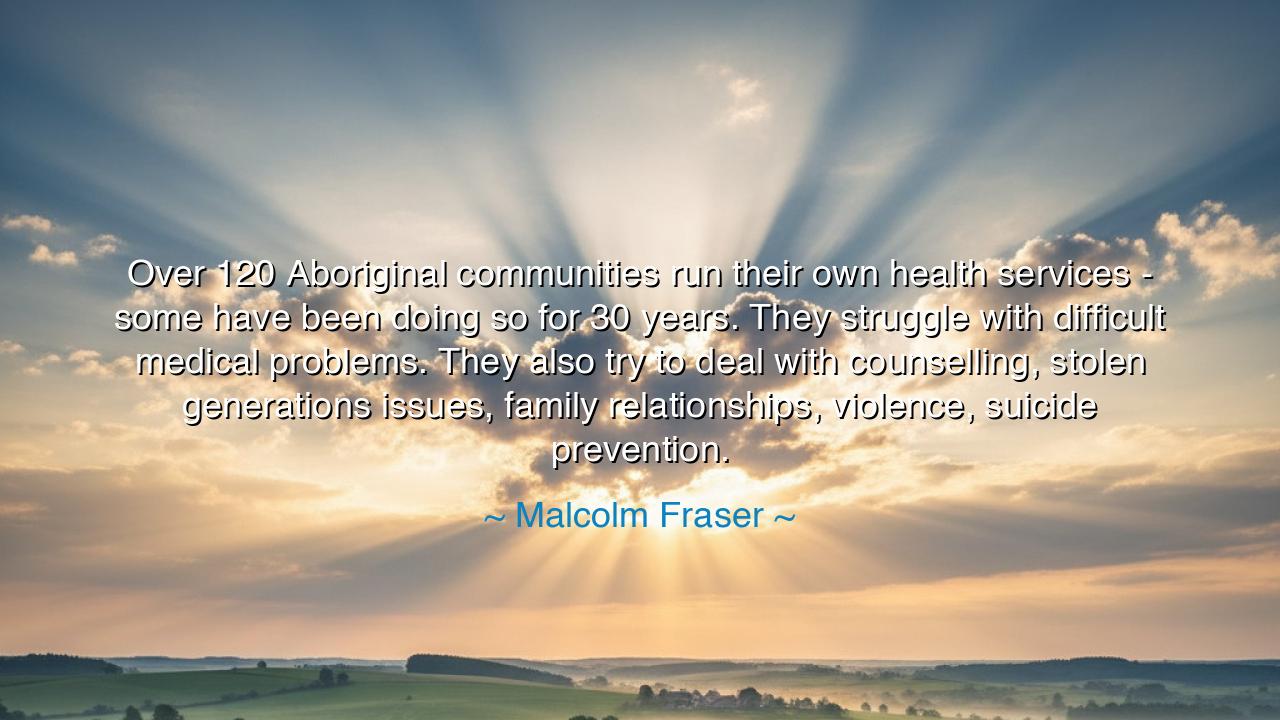
Over 120 Aboriginal communities run their own health services -
Over 120 Aboriginal communities run their own health services - some have been doing so for 30 years. They struggle with difficult medical problems. They also try to deal with counselling, stolen generations issues, family relationships, violence, suicide prevention.






Hearken, O seekers of justice and compassion, to the words of Malcolm Fraser, who proclaimed: “Over 120 Aboriginal communities run their own health services—some have been doing so for 30 years. They struggle with difficult medical problems. They also try to deal with counselling, stolen generations issues, family relationships, violence, suicide prevention.” Within these words lies both sorrow and strength, a testimony to endurance born of suffering, and to the unyielding spirit of a people who have chosen healing over bitterness, and creation over despair.
From the earliest days of colonization, the Aboriginal peoples of Australia faced dispossession, disease, and the tearing of families from their ancestral roots. Their lands were taken, their children stolen, their cultures demeaned. Yet within this long night of sorrow, their resilience endured like a flame guarded in the wind. Fraser’s words shine a light upon this truth: that in the face of injustice, these communities rose to reclaim control over their own wellbeing, establishing clinics and services built not upon charity, but upon dignity, identity, and self-determination.
These health services are not mere institutions—they are sanctuaries of healing for body and spirit. Within their walls, the wounds of colonization are tended: not only the physical ailments wrought by poverty and neglect, but the spiritual scars of disconnection, trauma, and loss. The struggles Fraser names—violence, suicide, broken relationships—are not born in isolation; they are the echoes of generations denied their voice. Yet the very act of confronting them, of training healers within their own culture, of speaking truth and offering care, is itself an act of resistance and renewal.
Consider the story of the Central Australian Aboriginal Congress, founded in the early 1970s in Alice Springs. What began as a small movement of Indigenous activists demanding better health care became one of the largest and most respected Aboriginal-controlled health organizations in the nation. Their clinics serve thousands, blending Western medicine with traditional wisdom, and addressing not only the symptoms but the roots of suffering—poverty, grief, and alienation. Their example embodies Fraser’s recognition: that healing must come from within, guided by those who understand both the pain and the culture of their people.
Fraser’s words also reflect the transformation of conscience within leadership. Though once a conservative Prime Minister, he grew into a champion of human rights and reconciliation, recognizing that justice is not achieved through policy alone, but through the empowerment of the oppressed. His tribute to Aboriginal-run health services is thus more than praise—it is repentance in action, an acknowledgment that the right to self-governance is essential for both healing and equality.
The lesson of his statement is profound: healing is an act of sovereignty. To rebuild a broken people, one must return to them the power to shape their own destiny. Health, in this sense, is not merely medical—it is moral, social, and spiritual. A nation that honors its first peoples must not dictate their recovery but support their leadership, their knowledge, and their right to decide what wellness means in their own language and land.
Practical action flows from this wisdom: listen to Indigenous voices, support their institutions, and recognize that reconciliation is not charity, but justice fulfilled. Let those who govern walk humbly beside those who endured, learning from their courage and their wisdom. Every community that takes its health and healing into its own hands becomes a light for others—a beacon of resilience, dignity, and hope.
O seeker of understanding, remember this: the greatness of a nation is not measured by its wealth or might, but by how it honors those who suffered most within its borders. Let the words of Malcolm Fraser guide you—to see in the Aboriginal health services not merely centers of medicine, but temples of courage. For they heal not only bodies, but the soul of a people, and through them, the soul of a nation itself.






AAdministratorAdministrator
Welcome, honored guests. Please leave a comment, we will respond soon